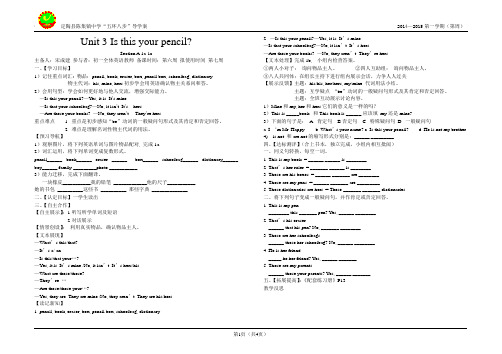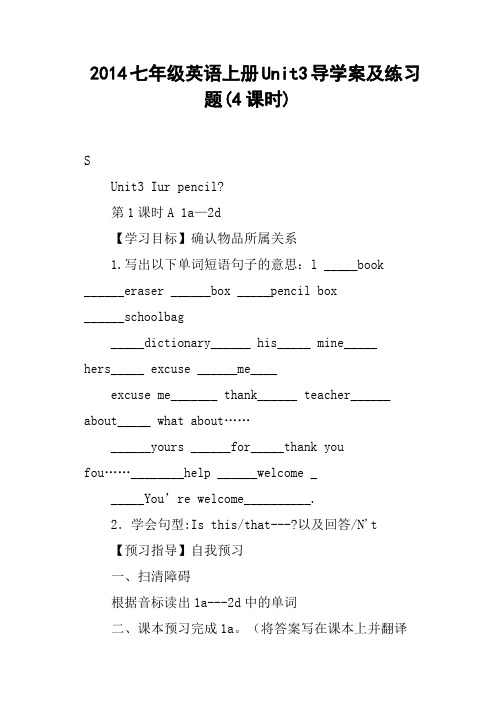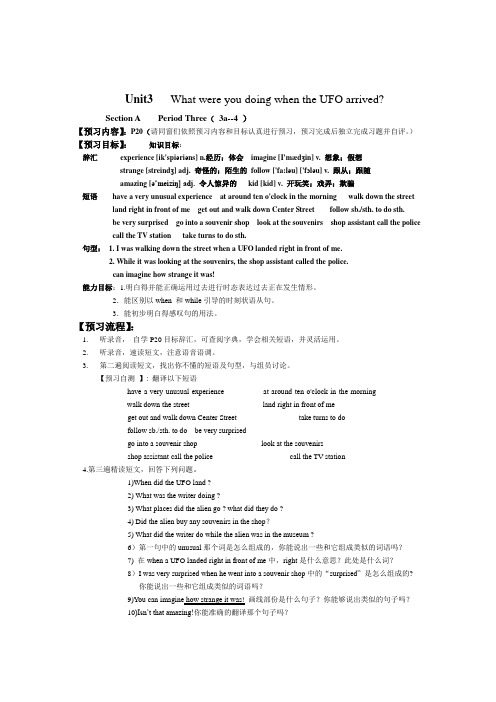初一英语导学精练(Unit 3)
- 格式:doc
- 大小:37.50 KB
- 文档页数:4

Unit 3 Is this your pencil?Section A 1a-1c主备人:宋成建参与者:初一全体英语教师备课时间:第六周拟使用时间第七周一、【学习目标】1)记住重点词汇: 物品:pencil, book, eraser, box, pencil box, schoolbag, dictionary物主代词:his, mine, hers初步学会用英语确认物主关系问和答。
2)会用句型:学会如何更好地与他人交流,增强交际能力。
—Is this your pencil?—Yes, it is. It’s mine.—Is that your schoolbag?—No, it isn’t. It’s hers.—Are these your books? —No, they aren’t. They’re hers.重点难点 1. 重点是初步感知“be”动词的一般疑问句形式及其肯定和否定回答。
2. 难点是理解名词性物主代词的用法。
【预习导航】1)观察图片,将下列英语单词与图片物品配对, 完成1a.2)词汇运用,将下列单词变成复数形式。
pencil______ book______ eraser ______ box______ schoolbag______ dictionary______ boy______ family _________photo ___________3)能力迁移,完成下面翻译。
一块橡皮___________我的铅笔_____________他的尺子___________她的书包__________这些书__________ 那些字典______________二、【认定目标】一学生读出三、【自主合作】【自主展示】:1听写所学单词及短语2对话展示【情景创设】:利用真实物品,确认物品主人。
【文本展现】—What’s this/that?—It’s a/ an—Is this/that your…?—Yes, it is. It’s mine./No, it isn’t. It’s hers/his.—What are these/those?—They’re ….—Are these/those your…?—Yes, they are. They are mine./No, they aren’t. They are his/hers.【读记新知】1. pencil, book, eraser, box, pencil box, schoolbag, dictionary2. —Is this your pencil?—Yes, it is. It’s mine.—Is that your schoolbag?—No, it isn’t. It’s hers.—Are these your books? —No, they aren’t. They’re hers.【文本处理】完成1b, 小组内检查答案。

Unit 3 Is this your pencil? Section A(1a-1c)[学习目标] 1、学会学习用品的英文表达。
2、运用形容词性物主代词和名词性物主代词来确认物品所属关系。
3、通过开展小组活动,提高解决问题的能力,教育学生养成良好的生活习惯,不乱放物品,避免丢失。
[学习重点] 1.形容词性物主代词和名词性物主代词的用法2.一般疑问句的肯定和否定回答[学习过程]自主预习重点词汇(默写,组内成员互改)1.书___________2.铅笔___________3.文具盒___________4.书包___________5.字典___________6.字典复数___________7.一块橡皮___________8.他的(名词性物主代词)___________9.我的(名词性物主代词)___________10.她的(名词性物主代词)___________合作探究1.例句:Is this a book? 这是一本书吗?Yes, it is. 是的,它是。
Is that your eraser? 那是你的橡皮吗?No, it isn’t. 不,不是。
这两个句子都是__________(一般/特殊)疑问句.在这种句型中名词要用_________(单数,复数)形式。
__________(this/that)用来询问较近的人或物, __________(this/that)用来询问较远的人或物。
肯定回答:___________否定回答:___________注意:答语不用this或that,而用_______代替this和that2.例句:Are these your pens? 这些是你的钢笔吗?No, they aren’t. 不是。
Are those his pencils? 那些是他的铅笔吗?Yes, they are. 是。
Are these/those …? 这些/那些是……吗?在这种句型中名词要用_________(单数/复数)形式。

初中英语同步导学初中一年级下Unit3Reading•在各组单词中找出重读位置不同的一个;()1. A. reception B. question C. minute D. athlete()2. A. fireman B.explain C. listen D. engine()3. A.manager B.against C. bottom D. suddenly()4. A.perfume B. different C. asleep D.restaurant()5. A. useful B. deli。
cious C. allow D.hotel•词汇练习。
A. 用所给词的正确形式填空。
1. The baby is ____________(sleep). Please be quiet.2. The phone is _____________(die). It doesn’t work.3. For your __________(safe), please don’t push.4. Listen! I can hear a dog __________(bark).5. We use our brain for ____________(think).B.根据所给的首字母,完成下列句子。
1. John is the m________ of the hotel.2. When there is a fire, try to find the fire e____________.3. A good sense of smell is u______ for a perfume maker.4. A group of f__________ came after the fire alarm went off.5. Our team will play a __________ Class 2 on Friday.•根据中文提示完成下列句子(每条横线只填一个单词)•音乐家通常有好的听觉。

七年级上册英语unit3 导学案(整理版)七年级上册英语unit3导学案(整理版)这是你的铅笔吗?第1节A1A-1c【学习目标】:1、掌握词汇pen,pencil,book,ruler,eraser,backpack,pencilbox,dictionary等2.学习句型:是这个/那个-?回答是,是/否,不是。
[学习重点]:掌握指示代词的用法:形容词所有格代词和名词所有格代词[学习过程]:一、自主学习(教师寄语:knowledgeispower.)学习任务1:掌握钢笔、铅笔、书、尺子、橡皮擦、背包、,pencilbox,,dictionary等1.仔细观察1a的图片,将单词与图片中的项目匹配,分组讨论并检查答案。
2.试着独立阅读,并在小组中纠正彼此的发音。
3.老师引导阅读,学生纠正发音。
4.自己阅读并记住中文意思,并在小组中进行核对学习任务二:学会句型:isthis/that---?以及回答yes,itis./no,itisn't.从而掌握指示代词:这个,那个1.先唱以下歌谣:我的my,你的your,男的his,她的her名词前面通常有一个guard,它定义了它所属的信用。
复习形容词所有格代词my,your,his,HER2使用宾语介绍句型:isthis/that-?使用不同的项目来练习我的,你的,他的,这里t:ThisisMy。
这是你的钢笔吗?s1:no,itisn't.it'syourpen/yours.etc.在口语中综合练习两种物主代词。
3.听录音,给1b对话编号4.练习1b中的对话。
用你所有的项目组成一个新的对话,并分组展示。
2、一起写一段对话,确认项目,并在课堂上进行交流和展示。
3、系统总结(老师的信息:任何人一次只能做两件事。
)物主代词是表示所属关系的代词分为形容词性物主代词和名词性物主代词。
名词形容词所有格代词单数MyYourHisher复数OurYour名词所有格代词单数myyourhisherits-1-1.形容词性物主代词相当于形容词放在名词之前起修饰限定作用。

2014七年级英语上册Unit3导学案及练习题(4课时)SUnit3 Iur pencil?第1课时A 1a—2d【学习目标】确认物品所属关系1.写出以下单词短语句子的意思:l _____book______eraser ______box _____pencil box______schoolbag_____dictionary______ his_____ mine_____hers_____ excuse ______me____excuse me_______ thank______ teacher______ about_____ what about……______yours ______for_____thank youfou……________help ______welcome ______You’re welcome__________.2.学会句型:Is this/that---?以及回答/N't 【预习指导】自我预习一、扫清障碍根据音标读出1a---2d中的单词二、课本预习完成1a。
(将答案写在课本上并翻译成汉语)2.完成2d对话,熟读、翻译成汉语;自己仿写对话。
【课内学习】一、教材处理:检查1a 2d 的预习效果。
小组实物练习句型:T:TIur pen?:N't.It'2.听录音,完成1b,2a,2b,利用自己所有的物品小组编新对话。
【导学指导】(1)Is that/this …? 那/这是……?这是个一般疑问句句型,是用来确认物主关系的。
肯定回答:否定回答:N’t. 注意:答语不用this或that。
(2)A/those …? 这些/那些是……吗?在这种句型中名词要用复数式。
不用不可数名词.肯定回答:are.是的。
否定回答:Naren’t. 不是。
注意:不能用these或those来做简略回答。
(3)What about …? 意为“……怎么样?”, 相当于How ab out …?, 后面可接名词、代词或动词-ing形式。

Unit3What were you doing when the UFO arrived?Section A Period Three(3a--4 )【预习内容】:P20(请同窗们依照预习内容和目标认真进行预习,预习完成后独立完成习题并自评。
)【预习目标】:知识目标:辞汇experience [ik'spiəriəns] n.经历;体会imagine [I'mædʒin] v. 想象;假想strange [streindʒ] adj. 奇怪的;陌生的follow ['fa:ləu] ['fɔləu] v. 跟从;跟随amazing [ə’meiziŋ] adj. 令人惊异的kid [kid] v. 开玩笑;戏弄;欺骗短语have a very unusual experience at around ten o'clock in the morning walk down the street land right in front of me get out and walk down Center Street follow sb./sth. to do sth.be very surprised go into a souvenir shop look at the souvenirs shop assistant call the policecall the TV station take turns to do sth.句型: 1. I was walking down the street when a UFO landed right in front of me.2. While it was looking at the souvenirs, the shop assistant called the police.can imagine how strange it was!能力目标:1.明白得并能正确运用过去进行时态表达过去正在发生情形。
2023年秋季学期七年级上册导学案(仁爱版)Unit 3 Getting TogetherTopic 3 What would you like to drink?Section B【学习目标】1.学习餐馆相关用语的表达。
2.继续学习日常生活中饮食的表达。
【自主学习新词汇】一、拼读下列单词并记忆。
1. usually adv. 通常地2. breakfast n. 早餐3. lunch n. 午餐4. dinner n.晚餐;正餐5. food n. 食物6. may mod al v.可以;可能7. take v.拿;乘坐;花费;服用;携带8. order n.点菜;命令;顺序v.命令;点菜;组织9. sir n. 先生10. something pron.某物,某事11. glass n.(玻璃)杯12. OK interj.好,行13. well interj. 好吧,那么adj. 健康的;良好的【课前预学】可数名词与不可数名词(二)1.可数名词有单数和复数形式。
如:map→maps,tomato→tomatoes,family→families等。
2.可数名词前面可以用不定冠词a 或an修饰。
如: a ruler, an apple 等。
而不可数名词前不能用a或an。
3.可数名词前通常可直接加数词来表示数量。
如:two eggs, five desks等。
表示不可数名词的数量时,要用“数词+表示量的名词+ of +不可数名词”。
如:abottle of milk 一瓶牛奶;two cups of tea 两杯茶;three bowls of rice 三碗米饭。
4.可数名词前可用few,a few, many 等修饰。
如:a few boys;many bananas等。
而不可数名词用little, a little, much 等修饰。
如:a little water 一点水, much orange许多橘子汁等。
教与学学导练英语七年级下册配人教版Unit3过关训练答案1、— Can you ______ English? — No, but I can ______ the piano. [单选题] *A.say;joinB.speak;play(正确答案)C.say;wantD.tell;play2、— Can you play chess? — No, I ______. [单选题] *A.mustn’tB.can’t(正确答案)C.couldn’tD.needn’t3、Dick often helps him ______ his math. [单选题] *A.atB.with(正确答案)C.ofD./4、We want three good musicians ______ our school show. [单选题] *A.for(正确答案)B.joinC.toD./5、Can your brother ______ well? [单选题] *A.dance(正确答案)B.to danceC.dancesD.dancing6、The boy can play ______ basketball well, but he can’t play ______ guitar. [单选题] *A.the;/B.the;theC./;the(正确答案)D./;/7、I think drinking milk every morning is good ______ our health. [单选题] *A.toB.withC.atD.for(正确答案)8、—What’s the time? — ______ half past ten. [单选题] *A.ItsB.This isC.It’s(正确答案)D.They’re9、You have a bad ______. Ice-cream is not good for you. [单选题] *A.teethB.noseC.tooth(正确答案)D.mouth10、______ Jim and Sam go home at six? [单选题] *A.DoesB.Do(正确答案)C.IsD.Are11、It’s half past eight. I must go ______. [单选题] *A.workB.to work(正确答案)C.to worksD.to working12、This kind of candy smells terrible, but it ______ delicious. [单选题] *A.hasB.soundsC.tastes(正确答案)D.have13、Do you think the story is ______? [单选题] *A.funnylyB.funny(正确答案)C.funyD.funnily14、Please call Ken ______ 865-3362. [单选题] *A.forB.withC.at(正确答案)D.by15、Cathy always gets up early, __________she is never late for work. [单选题] *A.so(正确答案)B.whyC.butD.or16、Jackie Chan can ______ Chinese kung fu. [单选题] *A.playB.doesC.playsD.do(正确答案)17、Can you play basketball,football ______ volleyball? [单选题] *A.andB.or(正确答案)C.butD.so18、When do you get ______ Hong Kong? [单选题] *A.to(正确答案)B.upC.withD.in19、You can talk ______ Mr. Brown ______ more information. [单选题] *A.at;withB.to;withC.at;forD.to;for(正确答案)20、Here is the bus. Come ______! [单选题] *A.earlyteC.quickly(正确答案)D.slowly21、.I usually go to school _______ bike, but sometimes _______ foot. [单选题] *A.with;onB.on;withC.by;byD.by;on(正确答案)22、.— _______ does your father go to work every day?— He takes the subway. [单选题] *A.WhenB.WhereC.How(正确答案)D.Why23、— _______ is it from your city to Guangzhou?— About 260 kilometers. [单选题] *A.How oftenB.How longC.How manyD.How far(正确答案)24、 How long does it take to get to the library?— _______. [单选题] *A.You’re welcomeB.Thanks a lotC.Half an hour by bus(正确答案)D.About two miles25、It usually takes us twenty minutes _______ to the supermarket. [单选题] *A.walkB.walksC.to walk(正确答案)D.walking26、There’s not much time, so he goes to school after a _______breakfast. [单选题] *A.quick(正确答案)B.quicklyC.fastD.slow27、She _______ a bicycle to the market every day. [单选题] *A.takesB.rides(正确答案)C.byD.on28、He _______ go out because he has to help his mother _______dinner. [单选题] *A. can’t;make(正确答案)B.can’t;makingB. C.don’t;to makeD.doesn’t;made29、Can you help us _______our Chinese? [单选题] *A. forB. onC. toD. with(正确答案)30、 Miss Yang is good_______art. And she can be good_______children in the art club. [单选题] *A. at; atB. with; atC. at; with(正确答案)D. with; with31、 Victor wants to find a new_______. He doesn’t like to _______here. [单选题] *A. work; workB. job; jobC. job; work(正确答案)D. work; job32、 Either you or he_______homework here. [单选题] *A. doB. does(正确答案)C. to doD. doing33、 The apple_______. [单选题] *A. taste wellB. sound wellC. tastes good(正确答案)D. sounds good34、We have_______books in the bookcase. [单选题] *A. two hundred and sixty fiveB. two hundred and sixty-five(正确答案)C. two hundreds and sixty-fiveD. two hundred, sixty five35、My home is about _______walk from here. [单选题] *A. twenty minutesB. twenty-minutesC. twenty minutes’(正确答案)D. twenty minute’s36、—Do you go to school by __________ train? —No. I take_____ subway. [单选题] *A./,the(正确答案)B.the,/C.a,theD.the,the37、There is a bed_____ the desk _____ the sofa. [单选题] *A.from,toB.next,toC.between,onD.between,and(正确答案)38、There __________ a dictionary and two books in his schoolbag. [单选题] *A.areB.is(正确答案)C.beD.has39、Please cheer up(振作起来)!We believe your dream can _________ one day. [单选题] *e ine true(正确答案)e oute on40、—______________ is it from your home to the bridge?—Not very far. It's about 4 kilometers. [单选题] *A.How far(正确答案)B.How manyC.How muchD.How long41、— ____________ can we become good learners?—By working hard and asking the teachers for help. [单选题] *B.WhereC.WhenD.What42、— ________ do you think _____ your school life? —Great. [单选题] *A.How,likeB.What,of(正确答案)C.How,ofD.What,like43、Nancy is______________ [单选题] *A.nine years old girlB.a nine-years-old girlC.nine year oldD.a nine-year-old girl(正确答案)44、It's not easy for girls ________ soccer well [单选题] *A.playB.to play(正确答案)C.playingD.plays45、My grandparents' home is about 6 kilometers __________ my home. [单选题] *A.farC.ofD.at46、—Why does ____________ take Frank two hours to get home?—I don't know. Maybe the traffic is heavy(交通拥挤). [单选题] *A.thisB.thatC.it(正确答案)D.he47、There are nineteen_______ students in Sonia's school. [单选题] *A.hundred(正确答案)B.hundredsC.hundred ofD.a hundred48、—Do you know________ ? —Sorry, I don't know. [单选题] *A.where does Yang Li liveB.where does Yang Li live inC.where Yang Li lives(正确答案)D.where Yang Li lives in49、Some students were angry at being treated______ children. [单选题] *A.like(正确答案)B.likesC.is likeD.is liking50、—Do you ride the bike to _______ there?—Yes, . ______But sometimes I walk. [单选题] *A.get,I don'tB.get,I do(正确答案)C.get to,I don'tD.get to,I do。
七年级英语课堂练习(Unit 3)I.根据句意及首字母提示补全单词1. Fifty and fifty is a h ______.2. In most of China, students r______ bikes to school.3. His dad d_____ his car to work.4. You can take the t_____ to Beijing.5. We have a n_____ teacher this term.6. It’s about 15______(分钟)by bike.7. Their dreams can ______(实现).8. When do you want to______(离开)the village?9. The boy is _____(害怕)to ride the bike.10.They have to _____(穿过)a very big river.II.单项选择( ) 1._____ is it from here to the bus station?A. How farB. How longC. How muchD. How many ( ) 2. What do you _____ Changchun?A. likeB. thinkC. think ofD. get to ( ) 3.Many students get to school ______.A. take a subwayB. take the subwayC.by the subwayD.by subway ( ) 4. _____ your letter.A. Thanks forB. Thanks you forC. Thank you toD. Thanks to ( ) 5.—How do you come to school, walk or ride a bike?—______.A. Yes, I walkB. No, I ride a hikeC. Ride a bikeD. Walks ( ) 6. I usually go to work _____bike, but today I go to work_____ bus.A. by , byB. in , inC. by , inD. in , by ( ) 7.—When do you get _____?—At 11:00.A. homeB. to homeC. at homeD. in home ( ) 8.—_____ does it take you to walk home?—About twenty minutes.A. How longB. How oftenC. How soonD. How far( ) 9.—__________________?—She goes to work by boat.A. How does she go to work?B. When does she go to work?C. Why does she go to work?D. How does she goes to work?( ) 10.It takes me two weeks_____ the work.A. finishingB. finishC. finishesD. to finish ( ) 11.How about ______ there by bus?A. goB. goesC. goingD. going to ( ) 12. We often go to Beijing_____.A. on feetB. by a carC. by trainD. by the train ( ) 13.My math teacher______ a father to me.A. likesB. is like D. like D. is likes( ) 14.I love to play______ my classmates.A. onB. withC. forD. to( ) 15.She often goes to school on her bike. but sometimes she ____.A. walkB. is walkingC. walks.D. walking( ) 16. You ______ finish your homework on time.A. has toB. mustC. have toD. had to( ) 17.____takes me _____hour to do my homework.A. They, aB. They, anC. It, anD. It, \( ) 18.Liangliang is an _____ boy.A. 11-year-oldB. 11 year oldC. 11 years oldD. 11-years-old ( ) 19.There is a river _____ the school _____ the village.A. both, andB. between, andC. and, orD. like, and ( ) 20.For many students, it is easy_____ to school.A. to getB. getC. getsD. gettingIII.完形填空Tom wakes up(醒来) in the morning. Then he gets 1 . He always eats his breakfast at about 7:00. He has bread and milk for 2 . He leaves the house at 7:30. He 3 never late for school. Tom has four classes in the morning. At about twelve he comes home 4 lunch. In the afternoon he has two classes. After school ,he 5 his homework and plays with other children. In the evening, Tom’s 6 come back from work. They 7 supper together. After supper, Tom 8 newspaper or story-books. 9 he watches TV or listens to the radio. 10 about nine o’clock, he goes to bed.( ) 1. A. up B. out C. down D. in( ) 2. A. supper B. lunch C. breakfast D. dinner ( ) 3. A. has B. is C. will D. can( ) 4. A. at B. with C. for D. in( ) 5. A. do B. does C. play D. plays( ) 6. A. father B. mother C. parent D. parents ( ) 7. A. have B. take C. make D. get( ) 8. A. looks B. reads C. sees D. watches ( ) 9. A. Sometime B. Sometimes C. Some time D. Some times ( ) 10. A. On B. In C. At D. ForIV.阅读理解AWhen you are in England, you must be very careful in the streets because the traffic(交通) drives on the left(左边). Before you cross a street, you must look to the right(右边)first and then left.In the morning and in the evening when people go to or come from work, the streets are very busy. Traffic is the most dangerous then.When you drive a car in England, you have to be careful, too. Always remember the traffic drives on the left. So you must be careful. Have a look, or you will go the wrong way.In many English cities, there are big buses with two floors(层). You can sit on the second floor. From there, you can see the city very well. It’s very interesting.( ) 1. In England the traffic must go _________.A. on the leftB. quicklyC. on the rightD. in the middle ( ) 2. When you cross the street, you must look to ________.A. rightB. the front and backC. leftD. the right first, then left( ) 3.Traffic is the most dangerous in the morning and evening because ______.A. people are doing some shoppingB. people are waiting for a busC. people go to or come from workD. some people go on the wrong way ( ) 4. It’s very interesting to sit ___________.A. on a busB. on a two-floor busC. on the second floor of two-floor busesD. on the first of two-floor buses( ) 5. In China, people drive ___________.A. on the leftB. quicklyC. on the rightD. in the middleBPeople go to work in different ways. Some people go to work on foot, because they live near their work places. Some people go to work by bike because they live far away, or they like riding bikes. They think it’s good for their health. Today a lot of people have private (私人的) cars, so they can go to work in their cars. In the south(南部) of China, many people go to work by boat because water is around their houses. Will people go to work by plane? I think so, if necessary(必要的).按要求完成下列各题(1题判断正误,2题完成句子,3、4题回答问题,5题将划线部分句子译成汉语)1.All people like to go to work by bike.______2.Some people go to work by bike, because they think it’s good for______.3.Do many people have private cars ?______________________________4.Why do some people go to work by boat ?_______________________________5. _______________________________V.连词成句1.does, to, how, he, go ,school__________________________________?2.Maria, walk, after, supper, a, takes___________________________________.3.have, a, they, to, river, cross, do____________________________________4.bridge, have, villagers, a, want, the, to____________________________________5.school, day, to, walks, every, he____________________________________?VI.书面表达观察一下你的同学上学所使用的交通工具并整理下来,可以适当陈述他们选择各种工具的理由,字数在50词左右。